- Home
- Upton Sinclair
O Shepherd, Speak! Page 18
O Shepherd, Speak! Read online
Page 18
9
Joyful News at Hand
I
Orders for Mr. Lanning Prescott Budd, and not from Monuments or Alsos, but from G-2 of SHAEF, most imposing; he was to report “for special interrogation purposes” to Colonel Koch of G-2 of Third Army, in the city of Luxembourg. Mr. Budd needed no powers of divination to guess what that meant; Patton’s forces had captured some German of importance, whom they hoped by tactful persuasion to convert into a source of information. It was to Colonel Koch that Lanny had been sent a few months previously to meet his old friend General Emil Meissner, and Lanny’s magic had worked dependably. He wondered who it would be this time and tried to think of some German who was likely to be at the western front and to have mentioned the Führer’s onetime American friend.
A flight to headquarters of Third was a matter of no more than an hour. The weather in early March was bad, and the passenger was tossed about and instructed to put on his parachute. He was shaky in the knees when the plane landed; but one didn’t say anything about that in the Army. He was set down in a valley close to a very old city, on cliffs along a river lined with breweries and distilleries. He was driven through a viaduct to the headquarters from which Patton’s war was directed, a former home for the aged; quite an elegant place, but now damaged by shells. There he met the scholarly Intelligence officer who had so well justified his right to the title.
The weather being what it was, there was no need to ask the visitor if he had had a pleasant trip. The colonel seated him in a comfortable chair, offered Lanny a drink to steady his nerves, and then asked, “Mr. Budd, do you know a German officer, General-Major Furtwängler?”
“Very well indeed.” Lanny had guessed that name among the first. “I have known him since thirty-three, when the Nazis took power. He had just been made an Oberleutnant on Göring’s personal staff.”
“He was shifted recently to the line and commanded the 117th. Division, 53rd Corps. He got separated from his main body escaping from Trier, and he and a couple of his officers were looking for their headquarters. They came upon a group of our tanks and mistook them for Panzers; by the time they realized the mistake we had them covered.”
Lanny said, “Furtwängler is an amiable fellow, but not especially bright. He was humbly devoted to Göring, and I think was a loyal Nazi. Of course I don’t know what the recent defeats may have done to his mind.”
“He seems very melancholy. He tells us he has a family in Germany. He is greatly worried about their safety—asked us to give it out that he had been taken in combat, as otherwise the Nazis might punish them. We obliged him, since we had hope that he might be able to give us information.”
“On Göring’s staff he had opportunity to get a great deal. In the line, of course, he would be apt to know only local conditions.”
“He seems to like talking,” said the G-2 officer; “but so far he hasn’t told anything of importance. He mentioned that he knew you very well.”
Lanny explained, “My father had business dealings with Göring from almost the beginning of the regime. He took me along, and Furtwängler was the staff officer who had us in charge. We did our best to make ourselves agreeable, and he the same. Then a young Jewish friend of mine in Berlin got into trouble with the Nazis, and I went to Göring to try to intercede. The General, as he was then, seemed to find me amusing; of course I never could tell how much of that was policy, but he invited me to come back and I did. In 1937 President Roosevelt learned that I knew Göring and he commissioned me to go and try to get information. I was authorized to give Göring some in return, provided it wasn’t too important. Der Dicke has his attractive qualities, and I made much of appreciating them. I always met Furtwängler on these trips, and I am sure he genuinely liked me. For a time I had a rich wife, and I persuaded her to invite Furtwängler and his wife to dine with us at the Adlon. That ravished their souls; they thought they were moving in die grosse Welt.”
“All that sounds promising,” said the colonel, smiling. “We’d be glad to have you talk to him as long as it seems worth while. Bear in mind the Army’s policy: we do not promise immunity, but you can promise him special treatment—we are keeping a group of ranking officers separate. It wouldn’t do to expose those who give us information to the anger and possible abuse of the others.”
II
The son of Budd-Erling was esconced in what had been the very small bedroom of a superannuated Luxembourger. It was provided with two armchairs and a table with a bottle of “liberated” schnapps and a package of American cigarettes, better than money in any part of wartorn Europe. The captured General-Major was brought in, spruce and elegant—his uniform had been cleaned and pressed for him, as part of the process of winning him over. He had lost a little of that embonpoint which he had been accumulating in years of good living at the Berlin Residenz and at Karinhall, but still he was rotund and hearty. He had been told Lanny was coming and had got over his melancholy, at least for the moment.
Lanny rose. It was forbidden to shake hands with captured enemy officers—that was “fraternizing”; but the rule didn’t apply to interrogation men, who were free to use whatever technique they thought might work. Lanny behaved as if nothing had happened, as if the war was all a bad dream. “Ja, Günther, bist Du’s wirklich? Wie freue ich mich Dich wiederzusehen!” They spoke German, as always, and were alter Freund and lieber Lanny.
Furtwängler had been told that Lanny was not a regular military officer but only an art expert in uniform; so Lanny didn’t have to explain that he hadn’t harmed any dear Germans but was doing what he had always done, trying to save beautiful works of art and put them in places where people might have a chance to enjoy them. He asked after Furtwängler’s family and told about his father’s health, and that of Irma Barnes and their little daughter. He asked after the Reichsmarschall and other friends on the staff and at Karinhall.
Said the art expert, “I don’t know what you have been told about the terrible thing that happened to me in Germany. Tell me what you heard.”
“I was informed that you were supposed to be an American spy.”
“And did you believe that?”
“I didn’t know what to believe, Lanny. How could I?”
So Lanny began the spiel that he had studied carefully and tried out successfully on Heinrich Jung. The most dreaded chief of the Gestapo and of the SS, Reichsminister Heinrich Himmler, had come to Lanny in the New Chancellery Building and begun an elaborate siege of his mind, trying to find out what would be Lanny’s attitude, and the attitude of the American government, to Himmler’s assumption of power in the event of the Führer’s death. Himmler had said that the Führer’s health was failing fast; but Lanny had doubted this and felt certain that Himmler knew of some plot against the Führer’s life, or perhaps was instigating one himself.
“Anyhow, I knew that my life wasn’t worth a pfennig in Germany after that. I had no way to get word to the Führer without Himmler’s knowing it; and how could I expect the Führer to take the word of an enemy alien against that of his most trusted friend, the man who had charge of his protection. I had no means of guessing whether Himmler was trying to test my loyalty to the Führer, or whether he was the man behind the plot which came to a head last July in the bomb attempt on the Führer’s life. I didn’t know then and I don’t know now. I asked the help of friends in getting out of Germany, and I got out, and of course I can never go back.”
What means had a general officer of humble origin, neither a prominent party member nor a favorite of the Junker elite, of judging the truth of such a tale? He could have no means, and that was why Lanny told it. The General-Major was like a man who, walking, suddenly sees an abyss opening before his feet. He said, “I know these dreadful intrigues—diese fürchterlichen Verschwörungen. After all that the Führer has done for these men, the heights to which he has lifted them! He was all right so long as he was sweeping them to victory; but now that he encounters troubles—” The speaker stopped, becau
se he didn’t want to say too much.
“It has been a bitter experience to me,” declared the American. “I took risks for the Führer. I jeopardized my own position. I want you to know that in my heart I have not changed; but my father was greatly distressed and insisted that I had no right to risk the ruin of my whole family. So I gave up; I am not going to fight National Socialism, but have gone back to what I was long ago, an art expert and lover of beautiful things. Some of these, I hope, can be saved out of the wreckage of our time.”
“I can’t say I blame you,” replied the German. Had he accepted Lanny’s tale, or had he decided to pretend that he did? In this game of cross and double-cross you could never be sure. Anyhow, they would start from there.
III
It was Lanny’s tactic to throw this captive officer into a still deeper state of melancholy. He told how, since joining the American Army half a year ago, he had been able to see from the inside the plans for the annihilation of Germany and had become convinced that the Fatherland had no choice but surrender. Lanny, who had loved the German people since childhood, thought only of saving German lives, and the old German towns and splendid modern cities. Furtwängler must know that these last were being reduced to rubble by thousand-plane bombing raids, something the Germans had declared to be impossible, even after the first one had visited Cologne.
Now Lanny was in a position to know that the bombing was no haphazard affair, but was planned scientifically, on the basis of exact knowledge. He quoted from a list which Colonel Koch had shown him: Duisburg on the Rhine, the largest inland harbor in Europe, was in ruins; the marshaling yards at Hamm, which had handled ten thousand cars a day, were smashed beyond repair; the same with the three-miles-long Badische Analin works at Ludwigshafen, the optical works at Jena, the artificial rubber works at Huls, and all the airplane factories which Göring had boasted could never be destroyed because they were so scattered. They had all been located and were being steadily bombed—Siemens, Dornier, Heinkel, Argus, and Daimler-Benz in Berlin, Junkers at Leipzig, Messerschmitt at Nürnberg and Stuttgart, Heinkel at Warnemünde, Dornier at Friedrichshafen, Focke-Wulf at Hamburg.
Lanny argued, “All these plants could be turned to the production of peace goods; their destruction means that the German people are being condemned to destitution for a generation, perhaps for a century. And what is the sense of it? If the war is hopeless, in the name of common sense why not recognize the fact?”
“Germany is fighting for her existence, Lanny!” exclaimed the other. “We have been attacked—”
“Stellen Sie sich nicht dumm, lieber Günther! You know that Germany attacked Russia and thus made a two-front war for herself. And has somebody succeeded in keeping from you the fact that Germany declared war upon the United States?”
The General-Major passed this over, for it would have been embarrassing to admit that he had forgotten the fact. Instead he complained of “unconditional surrender” as a barbarous demand. Lanny assured him that it was an empty phrase; there were conditions imposed by American standards. “We do not kill the troops that surrender; we feed them, and if they are wounded they get medical care. It will be the same with the whole German people; there will not be a shot fired or a bomb dropped from the minute the surrender is signed. Do you realize that we have taken two million German prisoners since we landed in Normandy, and all those will some day be returned to the Fatherland?”
“I see that you have turned against the Führer!” lamented the SS-trained officer; to which Lanny repeated, “I have been forced to recognize the fact that the Führer’s cause is lost, and the only question is, how many more German cities are going to be destroyed and how many more German people are going to be killed to no purpose.”
IV
This argument went on the rest of the day. A Nazi-warped mind had to have a hundred delusions taken out of it; and once wasn’t enough—they popped back in and had to be removed again. Like Heinrich Jung, Furtwängler had been certain that the Battle of the Bulge would mean the capture of Antwerp and the annihilation of the American First Army and the British and Canadian armies. Now Lanny had to pound into him the fact that this dream was dead. Trier, in front of which Furtwängler had been captured, lay east of the southern shoulder of that Bulge; so now there was an American Bulge instead of a German. Lanny had seen recco photographs of Trier and offered to bring them to his friend; there was nothing but a few smoke-blackened walls of this, the oldest city of Northern Europe, a city founded by the ancient Romans. It had had ninety thousand inhabitants, and now they were scattered all over the German countryside, sleeping in cellars, in chicken houses, in caves or holes in the snow-covered ground.
Now Patton’s armies had turned to the east, headed for the Rhine. Coblenz was in front of them, and the airmen were reducing that to rubble. Coblenz, being on the west bank, would fall easy prey—
“But you will never be able to get across, Lanny!” exclaimed the Nazi and quoted “The Watch on the Rhine”: “Lieb’ Vaterland, magst ruhig sein!”
Lanny answered, “You were taught that as a child, alter Freund, but you must realize it is hopelessly out of date. The Third Army has crossed thirty-two rivers this year, and the Rhine is not so much bigger than the Moselle. We have a score of different devices, all of which have been well tested. We will have half a dozen bridgeheads on the right bank before this month of March is past.”
“What do you want me to do, Lanny?” demanded the despairing General-Major. “Turn traitor to my country?”
“I don’t want anything, Günther—I am just putting the facts before you and leaving it to your common sense. The quicker this fighting is over, the more Germans will be left and the more homes for them to sleep in and factories to work in. I should think that you would come to the same decision as General Meissner, for example—”
“Du lieber Gott!” exclaimed the Nazi, reverting to his childhood. “You mean that Emil Meissner has turned against the Führer?”
“I mean that he stood in front of the entire staff of the Third Army and gave them a detailed lecture on the fortifications of Metz, thus enabling the Americans to take it quickly and to make thousands of Germans into prisoners of war instead of corpses. There are several score high-ranking officers who have come to the same decision—I am not at liberty to name them all.”
“We have known, of course, that many of the Wehrmacht officers are traitors at heart—”
“There are some SS officers among them, Günther.”
“What have you done with them?”
“They are living very comfortably in a villa behind the front, and when we need information we go to them and get it.”
“What information have I that I could give you?”
“Surely you must know. I am here to save the art works of Europe from destruction. We take the position that these are the heritage of all humanity, and we shall do everything we can to save and preserve them.”
“And take them to America!”
“I give you my word of honor, I know the policy and can speak with authority. Everything is to be returned to its former owners.”
“Including German owners?”
“Certainly, unless they are persons convicted of war crimes. Works that were in German museums will go back to those museums. Those taken from France or other countries will be restored to those owners. That is the fixed policy, and the terms on which I came. You, Günther, must know where Göring has hidden all his acquisitions”—Lanny was careful not to say “loot”—“and the quicker we can find these things, the more chance we’ll have to save them from bombs, and from dampness and mold, and from fanatics who might think it a noble action to destroy them. Unless I know Hermann Göring less well than I think I do, he would approve this program; he must know by now that his last card is played and must be worrying about what will happen to his priceless treasures. You know he meant to turn Karinhall into a museum and make the art works accessible to all the people of the world.”
/>
V
General-Major Furtwängler had to have time to think this over, to let it soak into his mind. So the art expert went out and met some of the officers of CP of Third, whose code name was “Lucky Forward.”
G-2 had a spacious and elegant workroom with a lot of the plaster missing, and the commander had a solarium with broken glass patched with boards. The officers were quartered and messed in rehabilitated hotels near by. First you smashed things in a hurry, and then you repaired them in a hurry! They talked shop, and this was the way to know how the war was going, and to realize that it was being fought by human beings, not by machines. How the fellows on this staff didn’t like that bugaboo known as “Monty,” the British commander up north who was getting “gas” and “ammo” that Third so desperately needed! Monty wanted to win the war and reap the glory for himself, and so he sat on his backside and prepared and prepared, and when he advanced and got stuck in the mud of Holland he stopped and prepared some more. Meantime Georgie Patton fought and scratched, and called on Jesus Christ and God Almighty to help him get more supplies and kill more of the minions of Satan out there near the Rhine.
Georgie was like a wild horse that wants to gallop and goes crazy kicking against its hobbles. Georgie was fighting not merely the Germans but also an organization known as “CCS,” Combined Chiefs of Staff, consisting of elderly brass in Washington who sat on their backsides—Georgie’s favorite expression, only he used a shorter and uglier word. They sat four or five thousand miles away from the battlefront, evolved elaborate, beautiful-sounding plans, and communicated them to the Army as if they were a voice from Sinai, the ten tablets of the law. But that wasn’t the way you fought a war, the two-gun General insisted over and over to his staff. The way you fought it was to be right on the spot and to make split-second decisions based on your enemy’s reactions; you found a weak spot and you plunged through and poured in everything you had and kept him running like hell. “Old Blood and Guts” had a vocabulary, most of it unprintable, to describe his contempt for those officers who sat in padded armchairs in paneled offices and told the fighting men what not to do.

 Prince Hagen
Prince Hagen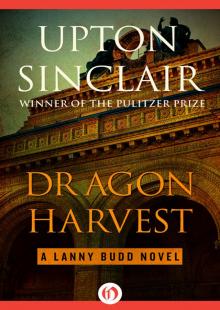 Dragon Harvest
Dragon Harvest The Jungle
The Jungle Sylvia's Marriage
Sylvia's Marriage Oil! A Novel by Upton Sinclair
Oil! A Novel by Upton Sinclair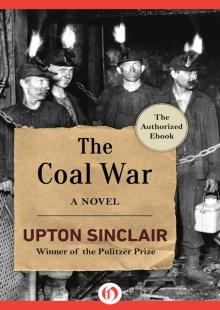 The Coal War: A Novel
The Coal War: A Novel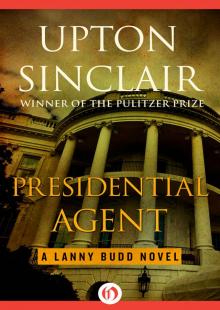 Presidential Agent
Presidential Agent World's End
World's End The Second-Story Man
The Second-Story Man O Shepherd, Speak!
O Shepherd, Speak! Wide Is the Gate
Wide Is the Gate The Return of Lanny Budd
The Return of Lanny Budd One Clear Call I
One Clear Call I 100%: the Story of a Patriot
100%: the Story of a Patriot The Machine
The Machine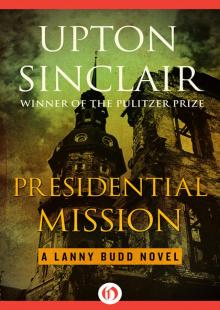 Presidential Mission
Presidential Mission A Cadet's Honor: Mark Mallory's Heroism
A Cadet's Honor: Mark Mallory's Heroism Between Two Worlds
Between Two Worlds World's End (The Lanny Budd Novels)
World's End (The Lanny Budd Novels) Between Two Worlds (The Lanny Budd Novels)
Between Two Worlds (The Lanny Budd Novels)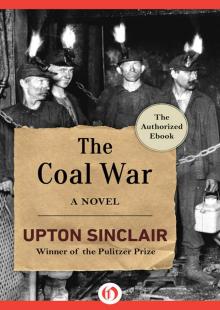 The Coal War
The Coal War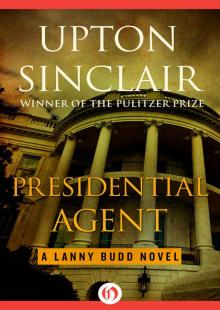 Presidential Agent (The Lanny Budd Novels)
Presidential Agent (The Lanny Budd Novels) Oil (filmed as There Will Be Blood)
Oil (filmed as There Will Be Blood) Wide Is the Gate (The Lanny Budd Novels)
Wide Is the Gate (The Lanny Budd Novels)